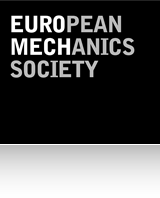522 – Recent Trends in Optimization for computational Solid Mechanics
Date:
10 October 2011 – 13 October 2011
Location:
Erlangen/Nuremberg, Germany
Website:
Chairperson:
Prof. Paul Steinmann
University Erlangen/Nuremberg
Erlangen,
Germany
email: paul.steinmann@ltm.uni-erlangen.de
Co-chairperson
Prof. Kai-Uwe Bletzinger
Technische Universität München
Lehrstuhl für Statik
80290 München, Germany
email: kub@bv.tum.de
Prof. Günter Leugering
Lehrstuhl für Angewandte Mathematik II
Martensstr. 3
91058 Erlangen, Germany
email: leugering@am.uni-erlangen.de
Prof. Ole Sigmund
Department of Mechanical Engineering
Section for Solid Mechanics
Technical University of Denmark
Building 404, DK-2800 Lyngby, Denmark
email: sigmund@mek.dtu.dk
The aim of the EUROMECH522 Colloquium is to identify recent trands in optimisation as applied to problems in Computational Solid Mechanics. Thereby the focus lies mainly in novel mthods and computational developments rather tan on mere practical and industrial applications of well-established approaches.
Since the advent of the finite element method in the middle of the last century, Computational Solid Mechanics is an ever developing scientific field steadily exceeding its current boarders. To date, e.g. the "multi"-problems like multi-physics- and⁄or multi-scale-problems are routinely and successfully addressed. Likewise, optimisation, as intensively investigated in the Applied Mathematics community has become a powerful tool in various scientific fields. Paradigmatic applications in Computational Solid Mechanids are the optimisation of the shape and the topology of solid bodies, and other inverse problems like the identification of material parameters.
However, since solving the direct problem is naturally a prerequisite for tackling an inverse problem as embodied in an optimisation task, challenges and corresponding solution methods in Computational Solid Mechanics, like new spatial and temporal discretisation approaches, advanced material modelling and approaches to coupled problems, are developing at a notably faster pace. Moreover, inverse problems are seldom well-posed and thus often demand sophisticated regularisation and solution techniques. It is high time to push optimisation to a higher level of attention and dedication, especially in the Computational Solid Mechanics community. An intention of the Colloquium is to foster the mutual exchange of ideas and recent methods and developments related to hot topics in optimisation for Computational Solid Mechanics between the Applied Mathematics and Computational Solid Mechanics communities.
